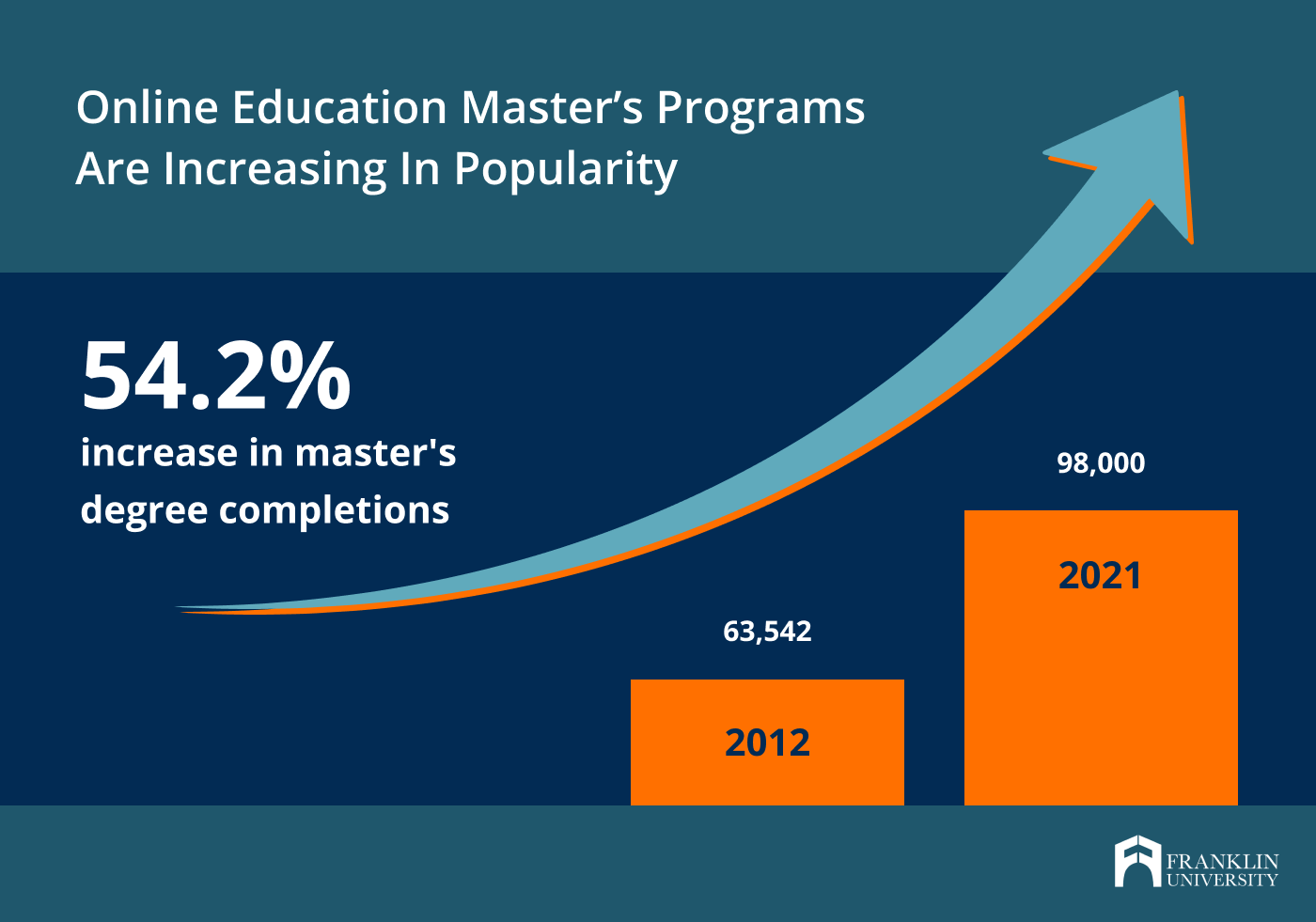Request Information
We're Sorry
There was an unexpected error with the form (your web browser was unable to retrieve some required data from our servers). This kind of error may occur if you have temporarily lost your internet connection. If you're able to verify that your internet connection is stable and the error persists, the Franklin University Help Desk is available to assist you at helpdesk@franklin.edu, 614.947.6682 (local), or 1.866.435.7006 (toll free).
Just a moment while we process your submission.

What Are the Requirements for a Master’s Degree in Education?
Education is a stable and growing industry, with teachers, administrators and other professionals always in demand. That’s especially true of highly qualified educators. A master’s degree is increasingly seen as a valuable indicator of knowledge and experience, and several states even require public school teachers to have or be working toward a master’s degree.
But what does it take to enroll in – and graduate from – an education master’s degree?
Who Is a Master’s of Education For?
There are several different types of master’s degrees available to educators and education leaders. One of the most versatile and well known graduate degrees for teachers, school leaders and others in the field is the Master of Education (M.Ed.). This degree is a valuable qualification for classroom teachers, educators who wish to move into leadership roles and professionals who work in education policy, nonprofits or roles like instructional design.
What are the Admission Requirements for a Master of Education Program?
Each school sets its own requirements for admission to an M.Ed. program, so it’s important to check what each program asks for early in the application process.
Typically, a bachelor’s degree from an accredited institution is required for entry to a master’s program. However, most M.Ed. programs do not require an undergraduate background in teaching.
Some programs require GRE test scores, and most require TOEFL scores for students whose native language is not English. Additionally, many programs require letters of recommendation, a personal statement and a minimum GPA. Some M.Ed. degrees are designed specifically for experienced educators and require a teaching license or experience in an educational setting.
Franklin’s M.Ed. in Educational Leadership requires a bachelor’s degree in any field and a minimum GPA, but does not require test scores, prior experience or teacher licensure.

What Do You Learn in a Master of Education Program?
Ultimately, the goal of an M.Ed. program is to help educators and education leaders improve student learning outcomes. In practice, that means exploring complex education issues and applying that knowledge to make learning environments more equitable and effective.
However, each university sets its own M.Ed. curriculum, so specific approaches vary. Most programs include coursework on educational theory, law and ethics, and diversity and inclusion, and many also offer specialized courses on topics such as instructional design, education research and evaluation and education policy.
Some M.Ed. programs offer concentrations in areas like K-12 leadership, higher education leadership, inclusive education or educational technology. Franklin’s M.Ed. in Educational Leadership offers focus areas in K-12 Building-Level Leadership and Higher Education Leadership.
Get a FREE education career action plan filled with resources and recommendations from those who are already there.
What Are the Graduation Requirements for a Master of Education?
Just like admissions requirements, each school sets its own requirements for graduation from a master’s degree program.
Typical requirements include earning a certain number of credits, maintaining a minimum GPA and completing core coursework and a capstone paper or research project. At Franklin, M.Ed. students use their capstone course to complete an action research project that positively impacts the educational environment they work in. They’re also asked to identify the project’s impact and share their learnings with the community.
Is a Master of Education Worth It?
Whether an M.Ed. is worth it for you depends on your career goals and aspirations, as well as your ability to invest time and money in a degree program. However, the financial payoff can be significant in many cases. The cost of an education master’s degree ranges widely, but at Franklin, you can earn your graduate degree for less than $25,000 in total, an investment which can open doors to higher salaries.
In many public school districts, teachers with a master’s degree are automatically paid an increased rate throughout their careers, a practice which can add up to a significant earning differential over time. According to the National Center for Education Statistics, public school teachers with a master’s degree earn a median annual salary that is more than $14,000 a year higher than the median salary for teachers with only a bachelor’s.
A master’s degree can also open up opportunities for more lucrative leadership roles, such as principal or superintendent, as well as positions in related fields like education policy and instructional design.

Take Your Education Career to the Next Level
In today’s complex educational environment, an M.Ed. can help you develop the tools to overcome complex challenges and improve students’ experiences and outcomes. Franklin’s Master of Education program is taught by expert teachers and education leaders and designed to help you develop actionable skills and knowledge that you can apply on the job from day one.
At Franklin, you can earn your M.Ed. 100% online without onerous entry requirements. Graduate in as few as 12 months, while maintaining the flexibility you need to balance your studies with your responsibilities in the classroom.
Learn more about earning a Master of Education in Educational Leadership at Franklin.





